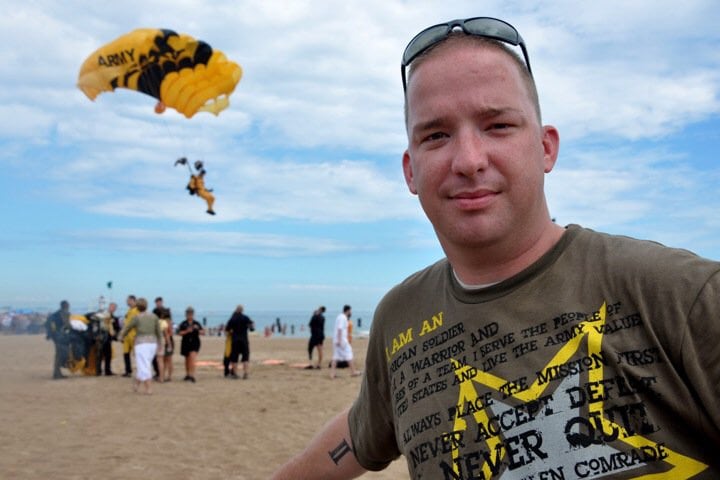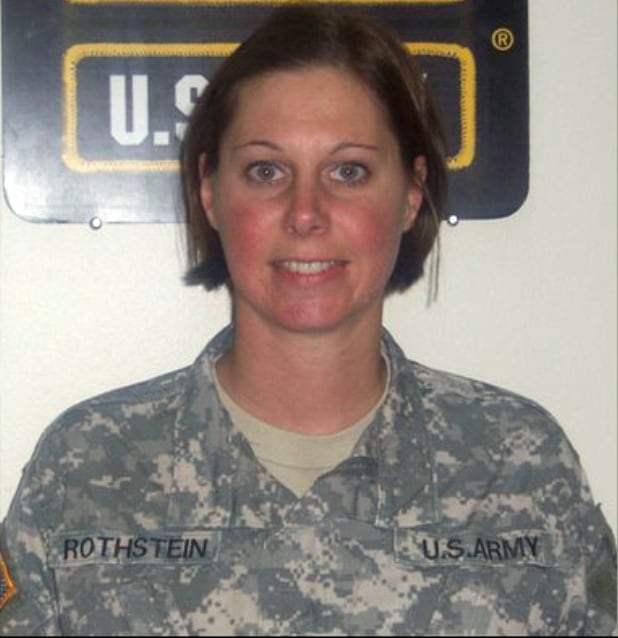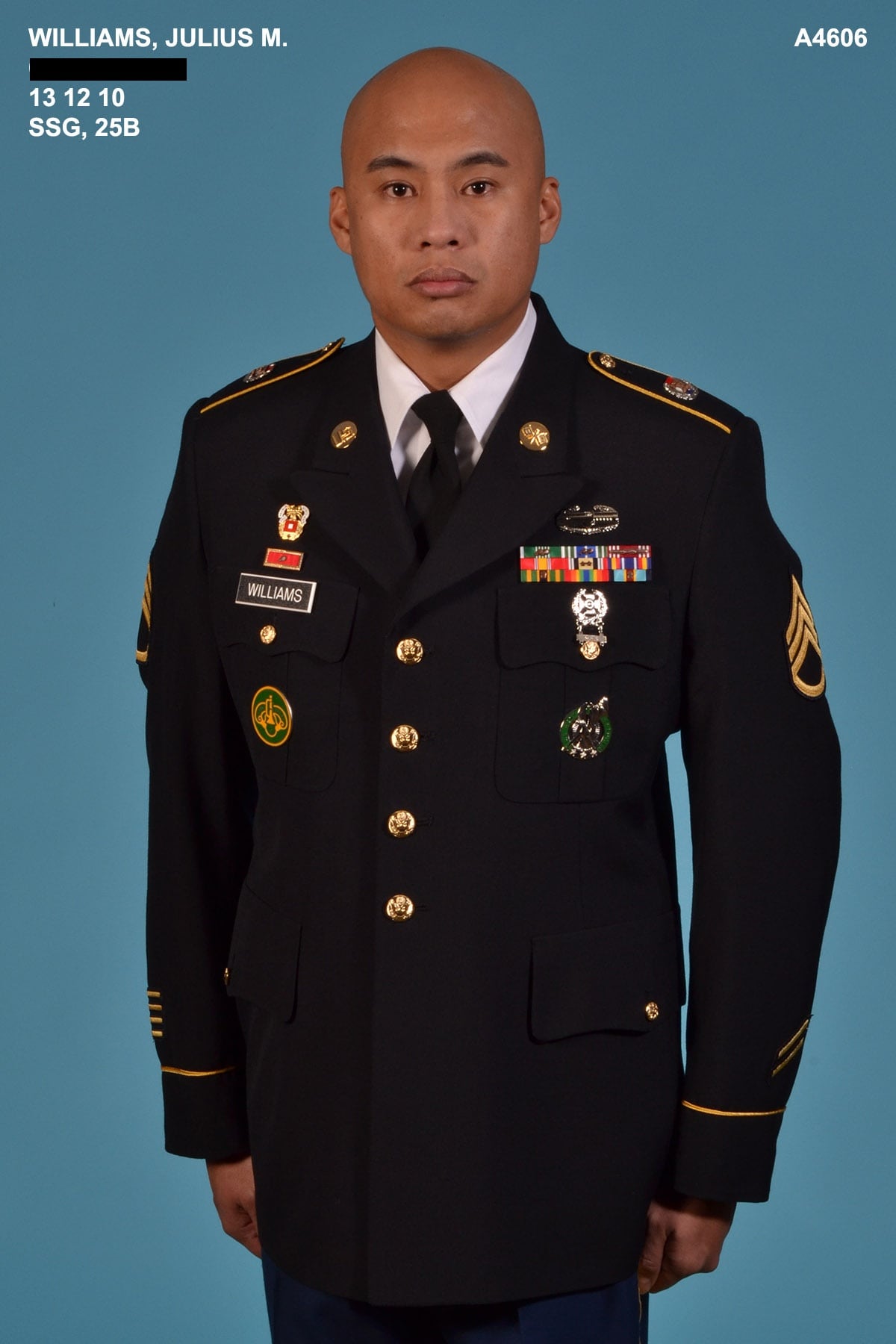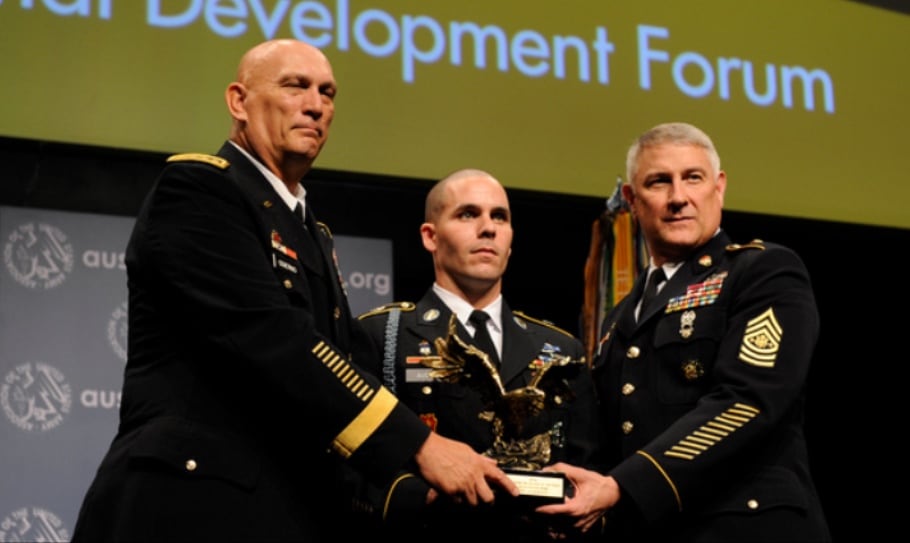Recruiting doesn't come natural to most soldiers, according to Sgt. 1st Class Joshua Morrison.
"Every recruiter I've ever come across, including myself, has said at first: 'this isn't what I expected.' Then 'I hate it.' Then 'I accept it.' And they start to get a little better at it," the center leader in Weatherford, Texas, told Army Times. "Eventually people start to love it and start to thrive on the challenge of it."
To Morrison, who has also hunted for future soldiers in New Hampshire and West Virginia, it takes time — and failures — to settle in with effective recruiting tactics.

Sgt. 1st Class Joshua Morrison
Photo Credit: Courtesy
Army Times talked to recruiters across the service who shared these tips and more for ensuring a steady stream of fresh soldiers. While you might call them trade secrets, don't call them "tricks" of the trade. The recruiters interviewed said they avoid deception, as it ultimately weakens the force with disillusioned soldiers and early washouts.
"We don't really use tricks. The best message to get through to somebody is harsh reality," Morrison said.
Recruiters know they're selling a long-term commitment that comes with restrictions alien to the private sector, to say nothing of the risks of combat-related jobs. There are physical demands and long hours. But the Army has perks, including benefit packages and a wide array of experiences and training. The Army tasks recruiters with finding young people and presenting an honest (but desirable) impression.
Eventually recruiters tend to figure out what works for them. They have to: even in a drawdown, the Army needs new soldiers. Nearly 9,000 recruiters will aim for 60,000 active duty Army recruits this year, slightly up from 2014. Maj Gen. Allen Batschelet, head of U.S. Army Recruiting Command, lamented that physical, mental and moral standards exclude about 70 percent of potential recruits, and an improving economy adds private-sector competition.
In short, recruiters have a limited pool of talent and plenty of competition. So how do they convince someone to sign up?
Here's a look at some of the most trusted recruiter tactics in use today:
Mastering high school
It's no secret that recruiters concentrate their energy on high schools, but it's not always about the students.
"The first thing we do before the school year starts, we get to faculty and staff. We tackle teacher institute days, teacher development days," said Sgt. 1st Class Duggan Myron, who runs a recruiting center in Columbia, South Carolina, after previously recruiting in his native Chicago.
A good relationship with a staff member can determine whether faculty refers a military-inclined student to the Army or to than another branch.
"First contact, first contract," Myron said.

Sgt. 1st Class Duggan Myron
Photo Credit: Courtesy
A peace offering can help. Myron said recruiters sometimes bring coffee and doughnuts along with business cards and a candidness about why they are there. Guidance counselors in particular have inherent value; they can help direct recruiters to students who might be lacking direction or asking questions about the military.
Recruiters vie for classroom access. Sgt. Candace Armstead, a recruiter out of Chesterfield Recruiting Center in Virginia since last summer, said one day she saw a social studies teacher dressed in a homemade civil war uniform: half-Union and half-Confederate. Seeing an apparent interest in the military, she approached him with a proposal: let combat veterans visit his class. He agreed.
"We're giving the teacher time they can use to grade papers, and the students are getting first-hand insight from somebody who's been to Afghanistan, who's been to Iraq," Armstead said.
Morrison and Myron both said some classes offer higher concentrations of students who would do well on the Armed Services Vocational Aptitude Battery (ASVAB); Myron said he asks guidance counselors to link him up with teachers of AP classes and STEM (science, technology, engineering, and mathematics) classes, especially ones with a high ratio of seniors.
Sometimes creativity can open more doors. One of Morrison's more kitchen-savvy recruiters in Weatherford offered to teach his "world-famous" lasagna recipe to a cooking class. Students asked if he learned how to cook like that in the Army; the infantryman had taken classes thanks to Army-funded tuition assistance while stationed in Hawaii, Morrison said.
"Two of them ended up enlisting in 92G (cook) based off his lasagna presentation," Morrison said. "When I call and say 'we've got a couple guys that want to do 92G, they say 'What?' They assume I did something shady."
Make parents your ally
High schoolers present another particular obstacle — or if a recruiter plays it right, an assistant: Parents.
"If you can convince a parent that this is the best move for their child, they will be your biggest motivator," said Myron, who as a personal rule will not formally interview a high school recruit without a parent present.
So how do you convince a reluctant parent?
Myron said a few weeks ago he had a high school senior with a step-father on board, but a mother who "wanted better" for her son. She had a common objection: the Army is inherently dangerous and she worried for her child's safety. His task: convince her the Army was good for the child's future.
While not promising zero-deployments or zero-risk, Myron said he talked about a human resources specialist he'd recently recruited, and went through the realities of some of the other 140-or-so non-combat jobs.
"We spoke for at least two hours," Myron said. "At the end of it, she wasn't just on board. She had her other son who is 20 years old come in, and he's joining as well."
The senior in high school now has his sights on a career in aviation. His older brother wants to be a mechanic — like Myron, a former wheeled-vehicle mechanic.
Other times, parents can be more sold than the recruit. Morrison said it happens to him probably about once a week, and it's easy to detect.
"Dad's reliving his glory days but junior isn't interested," Morrison said. "You've kind of got to peel back the onion on that, and ask 'what do you really want to do.'"
He takes the student into a room for a practice test and tells the father to wait outside. While setting up the test, he'll dig to see if the prospect really wants to do join. Sometimes he'll get a no, and it's just not a fit.
It can also flush out unspoken, surmountable objections. One time, Morrison pulled a student aside and learned that he wanted to get into graphic design.
"Did know we have multi-media illustrators in the Army?" Morrison asked him, and that got him on board. "Sometimes it's just overcoming the stereotype that all we do is hit things with a blunt object until it does what we want it to do."
Kids these days
Myron calls this generation the "on-demand" generation. He notes the ubiquity of social media and how it discourages face-to-face conversation.

Sgt. 1st Class Dana Rothstein
Photo Credit: Courtesy
Myron said he had a newly-signedrecruit help set up his center's social media; she informed him that kids spend far more time on Twitter and Instagram than Facebook, for example, and made social media efforts more efficient.
Sgt. First Class Dana Rothstein, who now works for Recruit the Recruiter (USAREC's mission to find recruiters) out of Fort Knox, Kentucky, said connectivity offers students a chance to quietly reach out. Some young people she's met at events didn't express much interest — perhaps hiding it from peers present — but later reached out to her via social media.

Sgt. Julius Williams
Photo Credit: Courtesy
"I have called all day, and they won't answer. As soon as you send a text they'll answer back," Williams said.
More counselor, less sales rep
Done correctly, several recruiters said, recruiting is not a sales job. You're more of a life coach and can't just tell a recruit everything he or she wants to hear. Myron called managing expectations an "everyday thing."
"As a brand-new recruiter, I thought it was sales. But the more I got into it and understood recruiting, (the more) it was counselor," said Myron.
Asking kids what they want most in life tells Myron how to make his pitch, and that pitch is designed to get a kid where he wants to go; the Army is just the "how."
"I tell kids 'Listen, is this what you want to do for the rest of your life?' Looking around, I say 'that's you in five, 10 years; is that what you want?'" Myron said. "Find out what makes these kids tick and you tailor what you say to that."
There was a recruit once who dreamed of owning his own home, rather than living in a double-wide. Myron told the recruit about his own zero-down home loan through the VA. He told another who wanted to own his own mechanic shop about the VA's small business loan, along with relevant career training in the Army.
Live in the community
Recruiters said their success rate is higher when they become part of the community rather than just fish in it.
"Those who serve as the Army's ambassador to the community and set a positive example, they aren't even looking at the enlistments," Morrison said. "They're looking at how they can help their communities and their high schools and project a positive image of the Army."
Before moving on to Recruit the Recruiter, Rothstein used to run recruiting centers in the Chicago area and in Knoxville, Tennessee. She said she'd go to a lot of local basketball and football games along with other community events; basically, anywhere a crowd might assemble presents not just a chance to meet recruits, but to relate to other community members.
"They have to see you as human, not just some robotic person out there for a number," Rothstein said.
Sgt. 1st Class Justin Austin will talk to people anywhere about the Army. Sometimes he doesn't lead with what he does and just strikes up a conversation, whether playing pickup basketball or just chatting with a waiter. He's always trying to project that image that would play well to a prospective recruit.

Sgt. 1st Class Justin Austin
Photo Credit: Courtesy
One team, one fight
All branches want smart, physically capable recruits. And they do compete. Batschelet said that while the Army does bring in the most recruits, opinion polling indicates that the Marine Corps and Air Force have more focused niches that excite bigger segments of the population.
Even so, recruiters bristled at the idea that their peers in other services are their competitors.
"We're not McDonalds and Wendy's and Burger King competing, we're the U.S. military," Myron said. "If you say 'I've decided to do Marine Corps, or Navy, I say thank you for serving your country."
Even selfishly, a positive relationship can lead to referrals – especially since branches vary in standards and job opportunities.
"We (refer recruits to other branches) openly," Morrison said. "We have applicants that come in with tattoos not within the Army's standards, but do fit with Air Force and Navy. It happens in this area…on a weekly basis."
The cordial relationship doesn't mean a recruiter won't prod and pry why another branch is favored; sometimes the issue stems from either a misconception or blind following of a family member to a branch without considering alternatives. But in the end, Myron said, you have to accept that some battles won't be won.
"Sometimes it's just 'Listen, I want to be a Marine,' and I say 'ok, go make this guy a Marine,'" Myron said. "I want someone that wants to be a soldier and not second-guess that."
Army's ace in the hole
Williams said he pitches the Army as the Walmart of the branches. No service offers as vast a selection of jobs. And there's a cherry-on-top, a secret weapon: the Future Soldier Remote Reservation System. It can show all jobs that are available and when a recruit would start basic — before the recruit commits. No other branch can offer that.
"Other branches tell me all the time: 'If we could guarantee a job, we'd be killing it," Morrison said. "Naval recruiters tell me, 'I tell them to sign a blank check and hand it to me. And they're not always comfortable.' That's the No. 1 appeal."
Although "you're not walking in looking for a truck and walking out with a Prius" as Williams put it, there are not unlimited "trucks," i.e. the best jobs. The military needs shower and laundry, motor transport operator and cooks, too, and sometimes a first-choice, or even second- or third-choice, isn't available.
Armstead stresses a "foot-in-the-door" ethos for those who can't get their first job choice; it's easier to re-classify than wait for a job from outside. She talks about how she knows plenty of people who have had four different jobs or more. She also stresses that popular training like Ranger School and Airborne School are available to soldiers of any MOS.
Restarting the cycle
At the mission's simplest, recruiters strive to pass on their own appreciation for the Army and what it's done for them. Generating that kind of enthusiasm is what keeps the Army supplied with soldiers – and eventually, recruiters.
"That was an awesome feeling," Rothstein said. "You can tell in her emails she's really grown up a lot."




